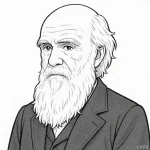“Man is a wingless animal with two feet and flat nails.”

- 427 BC – 347 BC
- Born in Athens, ancient Greece
- Philosopher, scholar, founder of the Academy
table of contents
Quote
“Man is a wingless animal with two feet and flat nails.”
Explanation
In this quote, Plato provides a physical description of human beings, emphasizing our limitations in comparison to other animals. The term “wingless” highlights that humans do not have the ability to fly like certain creatures, such as birds. The mention of “two feet” and “flat nails” is a simple reference to the physical characteristics that differentiate humans from other species, particularly those with claws or wings. Plato’s focus is on the biological reality of humans, underscoring that, unlike other animals, we lack the natural tools for survival or dominance in the physical world, such as the ability to fly or sharp claws.
This description, while seemingly focused on the physical, also hints at human vulnerability. Plato may be drawing attention to the idea that humans are dependent on reason and culture to compensate for these physical shortcomings. While we lack the natural abilities that other animals possess, such as speed, strength, or flight, we have the unique capacity for rational thought, creativity, and the development of tools and society. This aligns with Plato’s larger philosophical view that humans are defined by their capacity for wisdom and virtue, rather than physical traits.
In modern terms, this quote reminds us of human limitations and the way we must use reason and innovation to overcome our inherent vulnerabilities. It reflects a broader understanding of human nature, acknowledging that while humans may not have the natural advantages of other creatures, we compensate through intellect, empathy, and the creation of tools that allow us to shape our environment. Plato’s observation serves as a reminder of the human condition—physically limited, but capable of great potential through the use of our unique mental and moral capacities.
Would you like to share your impressions or related stories about this quote in the comments section?




